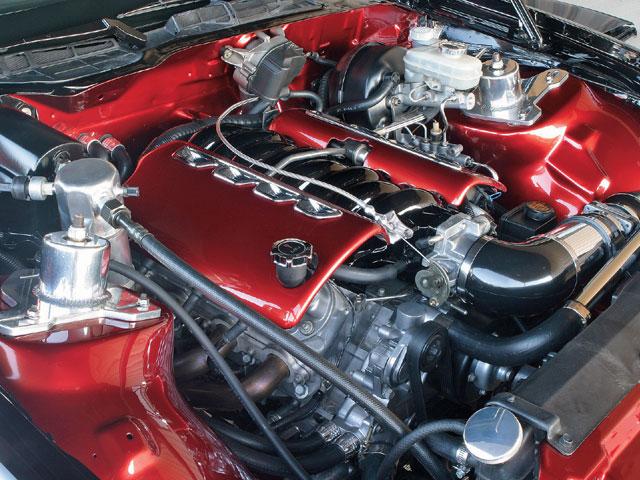It’s a fact: GM LS engines consume excessive amounts of oil. Supercharged or turbocharged engines, as well as engines regularly run to the rpm limit, use even more.
One reason for this high oil consumption is oil volatility. The harder you run your engine, the hotter the oil gets, causing some of it to evaporate. The rate of evaporation is measured as volatility. The higher the volatility rate, the more oil disappears from the engine.
Besides reducing consumption, another reason for reducing volatility is to keep oil vapors out of the PCV system. When too much oil migrates from the crankcase to the intake manifold through the PCV, the hot oil condenses in the cool intake air stream, leading to carbon buildup on the intake valves. If left unchecked, the carbon buildup can also lead to detonation.
Unburned oil expelled from the cylinders can coat the inside of the catalytic converter and prevent it from reaching its proper operating temperature. This creates deposits that impede exhaust flow and reduce power output. The oil will also poison the catalyst, increasing emissions and eventually destroying the catalytic converter.
With the right parts, you can substantially reduce, or possibly even eliminate, excessive oil consumption altogether—and it’s easier than you may think.
 The first thing you want to do is switch to oil with low volatility characteristics. Joe Gibbs Driven LS30 Oil is a highly-refined, industry-leading synthetic formula that’s tested and proven to keep the oil in the crankcase where it belongs. LS30 also provides best-in-class shear stability for greater wear protection and is optimized for increased oil flow at lower temperatures for improved cold-weather start-ups. And since LS30 has higher levels of ZDDP than other passenger car motor oils, it’s the best choice for high output engines that regularly see high rpms. Plus, LS30 is safe for use in vehicles equipped with catalytic converters.
The first thing you want to do is switch to oil with low volatility characteristics. Joe Gibbs Driven LS30 Oil is a highly-refined, industry-leading synthetic formula that’s tested and proven to keep the oil in the crankcase where it belongs. LS30 also provides best-in-class shear stability for greater wear protection and is optimized for increased oil flow at lower temperatures for improved cold-weather start-ups. And since LS30 has higher levels of ZDDP than other passenger car motor oils, it’s the best choice for high output engines that regularly see high rpms. Plus, LS30 is safe for use in vehicles equipped with catalytic converters.
 The next step is to remove residual oil vapors before they enter the PCV system. There’s no better way to do that than with an Air/Oil Separator from Moroso. The separator plumbs inline of the PCV system and captures the excess crankcase vapors before they reenter the engine. That means increased engine performance from cleaner intake air, significantly reduced carbon deposits on the intake valves, and less chance for detonation.
The next step is to remove residual oil vapors before they enter the PCV system. There’s no better way to do that than with an Air/Oil Separator from Moroso. The separator plumbs inline of the PCV system and captures the excess crankcase vapors before they reenter the engine. That means increased engine performance from cleaner intake air, significantly reduced carbon deposits on the intake valves, and less chance for detonation.
When used together, these two products are an excellent way to substantially reduce oil consumption, protect engines from damage, and keep them operating at peak performance.


this it good one to know. thank you.
A simpler way to put this, for anyone reading this, is to run a catch-can (what the Moroso product is normally called in the aftermarket) in the PCV lines and use a better quality oil.
It’s important to also make sure that the PCV system is venting properly by cleaning or just replacing your PCV valves. This will cut down on a large percentage of high mileage engines consumption issues.
I’m pretty sure PCV valves are non-existent on Gen III and later LS engines. Otherwise, I agree.